外研版(2019)选择性必修第四册 Unit6 Space and beyond单元语法详解课件(共23张PPT)
文档属性
| 名称 | 外研版(2019)选择性必修第四册 Unit6 Space and beyond单元语法详解课件(共23张PPT) | 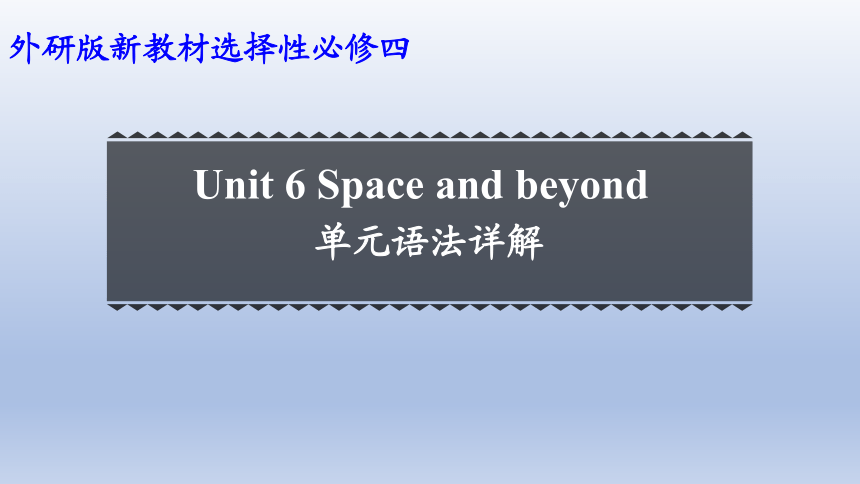 | |
| 格式 | pptx | ||
| 文件大小 | 956.2KB | ||
| 资源类型 | 教案 | ||
| 版本资源 | 外研版(2019) | ||
| 科目 | 英语 | ||
| 更新时间 | 2023-03-07 14:41:05 | ||
图片预览


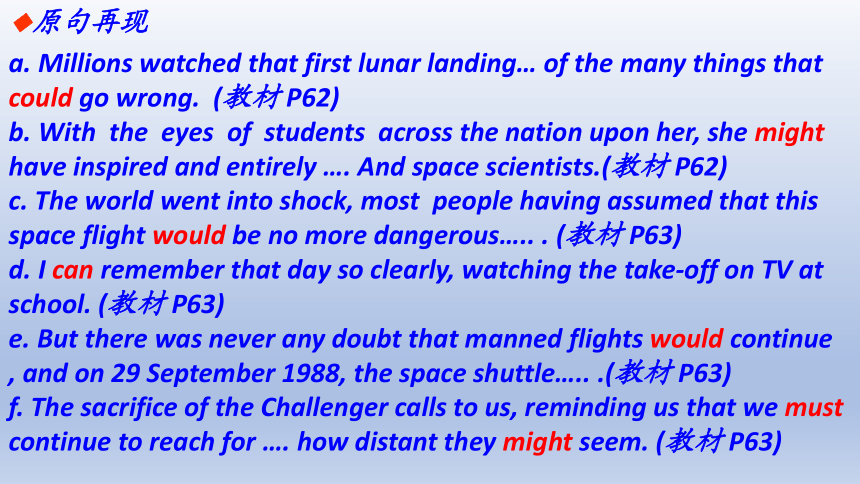

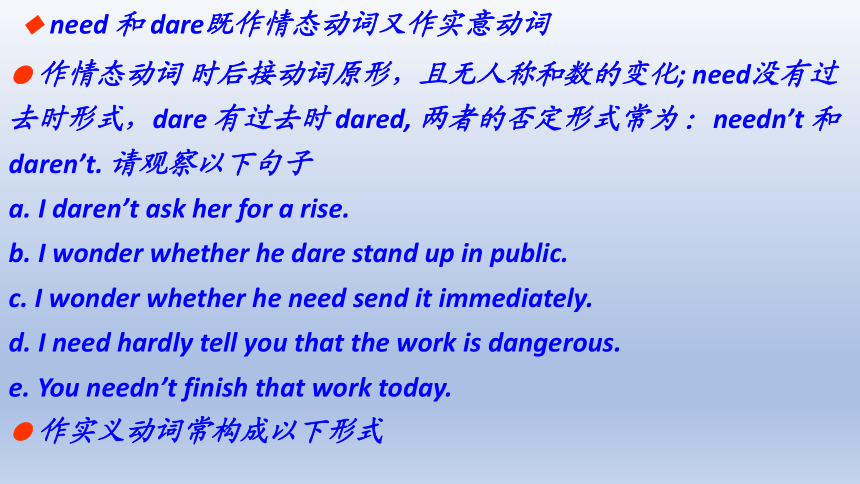
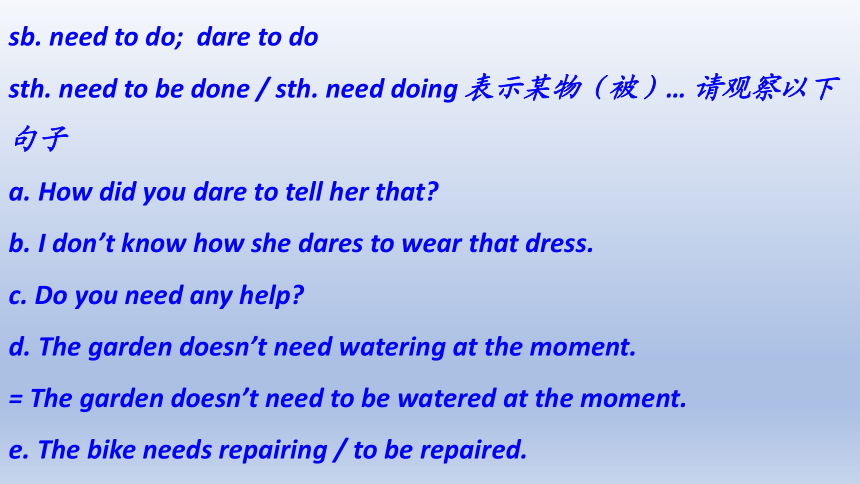
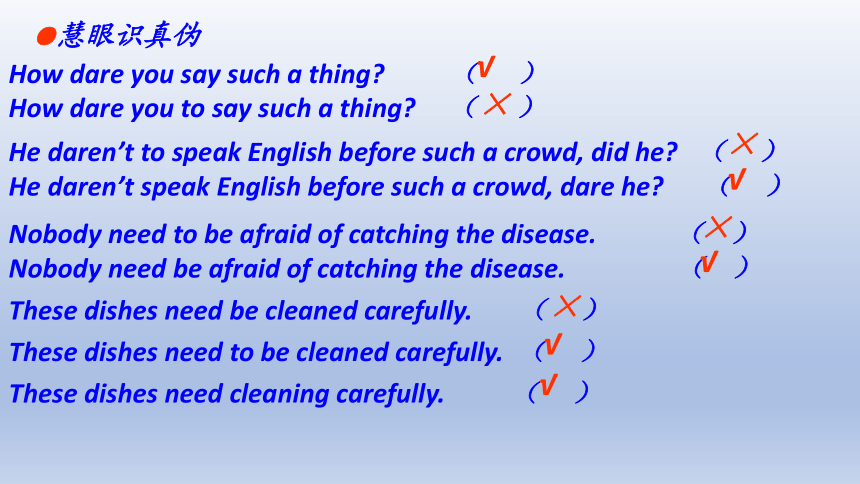
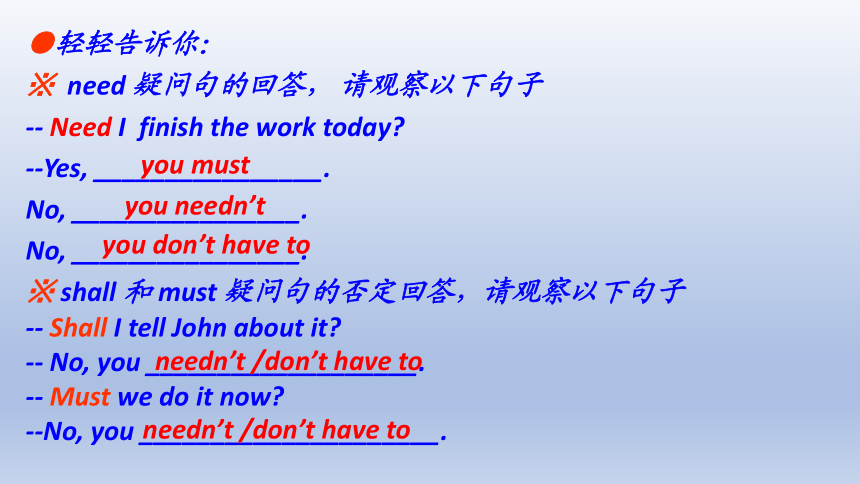

文档简介
(共23张PPT)
Unit 6 Space and beyond
单元语法详解
外研版新教材选择性必修四
本单元重要语法
情态动词
◆原句再现
a. Millions watched that first lunar landing… of the many things that could go wrong. (教材 P62)
b. With the eyes of students across the nation upon her, she might have inspired and entirely …. And space scientists.(教材 P62)
c. The world went into shock, most people having assumed that this space flight would be no more dangerous….. . (教材 P63)
d. I can remember that day so clearly, watching the take-off on TV at
school. (教材 P63)
e. But there was never any doubt that manned flights would continue
, and on 29 September 1988, the space shuttle….. .(教材 P63)
f. The sacrifice of the Challenger calls to us, reminding us that we must
continue to reach for …. how distant they might seem. (教材 P63)
◆情态动词
can could 能,会
may might 可能,可以
shall should 将要,应该
must (主观上)必须,一定
will would 将要, 意愿
ought to = should 应该
have to (客观上)不得不,必须
dare (daren’t) 敢
need (needn’t) 需要,必要
used to 过去常常
◆ need 和 dare既作情态动词又作实意动词
● 作情态动词 时后接动词原形,且无人称和数的变化; need没有过
去时形式,dare 有过去时 dared, 两者的否定形式常为 :needn’t 和 daren’t. 请观察以下句子
a. I daren’t ask her for a rise.
b. I wonder whether he dare stand up in public.
c. I wonder whether he need send it immediately.
d. I need hardly tell you that the work is dangerous.
e. You needn’t finish that work today.
● 作实义动词常构成以下形式
sb. need to do; dare to do
sth. need to be done / sth. need doing 表示某物(被)… 请观察以下句子
a. How did you dare to tell her that
b. I don’t know how she dares to wear that dress.
c. Do you need any help
d. The garden doesn’t need watering at the moment.
= The garden doesn’t need to be watered at the moment.
e. The bike needs repairing / to be repaired.
●慧眼识真伪
How dare you say such a thing ( )
How dare you to say such a thing ( )
He daren’t to speak English before such a crowd, did he ( )
He daren’t speak English before such a crowd, dare he ( )
Nobody need to be afraid of catching the disease. ( )
Nobody need be afraid of catching the disease. ( )
These dishes need be cleaned carefully. ( )
These dishes need to be cleaned carefully. ( )
These dishes need cleaning carefully. ( )
√
×
×
√
×
√
×
√
√
●轻轻告诉你:
※ need 疑问句的回答, 请观察以下句子
-- Need I finish the work today
--Yes, ________________.
No, ________________.
No, ________________.
※ shall 和 must 疑问句的否定回答,请观察以下句子
-- Shall I tell John about it
-- No, you ___________________.
-- Must we do it now
--No, you _____________________.
you must
you needn’t
you don’t have to
needn’t /don’t have to
needn’t /don’t have to
◆表示推测——情态动词的重要用法
1. You must be Mr. Smith--I was told to expect you here.
2. He must have known what we wanted.
3. We may have read the same report.
4. He can’t have slept through all that noise.
5. There’s someone outside----who can it be
6. What can they be doing
7. These pills might help to cure your disease.
8. You could be right, I suppose.
●请观察和欣赏
情态动词 对将来推测 对现在推测 对过去推测
肯定推测用 must(一定), may/might(可能) + 动词原形do + be doing +have done
否定推测can’t/couldn’t +not 动词原形 +not be doing +not have done
疑问推测can/could + 动词原形do + be doing +have done
● 大显身手
1. I don't know where she is, she _______ be in Wuhan.
2. At this moment, our teacher ________________our exam papers.
3. The road is wet. It ___________________ last night.
4. Your mother ________________________ for you.
5. Philip __________________________ seriously in the car accident.
6. -- Linda has gone to work, but her bicycle is still here.
-- She _______________________ (go) by bus.
7. Mike ________________ his car, for he came to work by bus this morning.
may
must be marking
must have rained
must have been looking
may (might) have been hurt
may (might) have gone
can’t have found
●真题链接
1. I thought you _______ like something to read, so I have brought you some books.
A. may B. might C. would D. must
2. Where is my pen I ______it.
A. might lose B. would have lost
C. should have lost D. must have lost
3. I didn’t hear the phone. I _________ asleep.
A. must be B. must have been
C. should be D. should have been
4. It’s nearly seven o’clock . Jack _________ be here at any moment.
A. must B. need C. should D. could
B
D
B
D
5. -- There were already five people in the car, but they managed to take me as well.
-- It ______a comfortable journey
A. can’t be B. shouldn’t be
C. mustn’t have been D. couldn’t have been
● 轻轻告诉你:不同的“肯定”程度可按层次排列, 请观察以下句子
He is at home. (事实)
He must be at home.(非常肯定的推断)
He could be at home.(很可能)
D
He ought to be at home.(很可能)
He may be at home.(仅仅可能而已)
He might be at home.(或许, 非常不确定)
He might not be at home.(也许不在家)
He may not be at home. (比might可能性稍大)
He couldn’t be at home.(很可能不在家)
He can’t be at home.(一定不在家)
He isn't at home.(事实)
◆表示能力、许可的情态动词的用法
表示能力: can, could, be able to
● be able to 能用于多种时态。
● can / could 只能表示现在或过去的能力。
※ 温馨提示:was / were able to : “设法做成或成功做某事”, 即 = managed to do sth. / succeeded in sth./doing sth./be successful in sth./doing sth.
1. A computer _______ think for itself; it must be told what to do.
A. can’t B. couldn’t C. may not D. might not
A
● 小操练
2. The fire spread through the hotel very quickly but they
______ get out.
had to B. would C. could D. was able to
3. They will _______ run this machine on their own in three months.
A. can B. could C. may D. be able to
4. That big cinema ______ seat 2,000 people.
A. can B. should C. ought to D. is able to
D
D
A
※ 悄悄告诉你:表示许可: may / might, can / could
might, could 比较委婉, 一般多用于疑问句. can, may 表达的语言比较随便. 在以could, might 表示征询对方意见或表示请求时,回答应相应使用 can, may.请看延续操练
5. -- Could I borrow your dictionary
-- Yes, of course you ______.
A. might B. will C. can D. should
6. -- Might I watch TV after supper -- Yes, you _____.
A. may B. must C. might D. can
C
A
◆表示否定的情态动词的用法(考察情态动词的重点和热点之一)
mustn’t 不准, 禁止 ; needn’t 没必要 ( = don’t have to );can’t 不能;
不可能; may not 不可以; 可能不; shouldn’t 不应该 ( = ought not to )
,请看延续操练
7. You ______ return the book now. You can keep it till next week if you like.
A. can’t B. mustn’t C. needn’t D. may not
8. Johnny, you ______ play with the knife, you ______ hurt yourself.
A. won’t ; can’t B. mustn’t ; may
C. shouldn’t ; must D. can’t ; shouldn’t
C
B
9. --Will you stay for lunch
--Sorry, _____. My brother is coming to see me.
A. I mustn’t B. I can’t C. I needn’t D. I won’t
10. --May I pick a flower in the garden -- ______.
A. No, you needn’t B. Not, please.
C. No, you mustn’t D. No, you won’t
B
C
◆情态动词:shall, will 的多种意义
※ 均可表示将来。 过去时为 should, would.
※ shall 可表示必须、命令、 警告或征询意见.
※ will 可表示意愿、常出现的动作、在疑问句 中表示请求和建议.
●请接着看延续操练
11. He ______ be punished if he disobeys.
12. We are not going to quarrel at all if you ____ only let me speak.
13. --Sir, ____ he go or stay --Let him go.
A. will B. shall C. might D. could
shall
will
B
14. The door _______ open.
15. Ronald ______ stay in his small garden for a long time every day in the past.
A. could B. might C. should D. would
16. You ______ have the book after I read it.
won’t
D
shall
●情态动词真题
1. Put on more clothes. You _____ be feeling cold with only a shirt on.
A. can B. could C. must D. would
2. -- Must I drive to his house and pick up the children
-- No, _______.
A. you shouldn't B. you might not
C. you needn't D. you mustn't
3. We didn't see Tom at the meeting yesterday. He it.
A. mustn't have attended B. cannot have attended
C. needn't have attended D. would have not attended
C
C
B
4. We play chess than bridge. Some of us don't know how to play bridge.
A. had better B. would better
C. would rather D. had rather
5. There is someone knocking at the door. _____ it be Tom
A. can B. must C. should D. ought to
6. If you live in town, it is often faster than a car and you ___
worry about parking.
A. must not B. may not C. should not D. don't have to
C
A
D
That’s all!
Thank you!
Unit 6 Space and beyond
单元语法详解
外研版新教材选择性必修四
本单元重要语法
情态动词
◆原句再现
a. Millions watched that first lunar landing… of the many things that could go wrong. (教材 P62)
b. With the eyes of students across the nation upon her, she might have inspired and entirely …. And space scientists.(教材 P62)
c. The world went into shock, most people having assumed that this space flight would be no more dangerous….. . (教材 P63)
d. I can remember that day so clearly, watching the take-off on TV at
school. (教材 P63)
e. But there was never any doubt that manned flights would continue
, and on 29 September 1988, the space shuttle….. .(教材 P63)
f. The sacrifice of the Challenger calls to us, reminding us that we must
continue to reach for …. how distant they might seem. (教材 P63)
◆情态动词
can could 能,会
may might 可能,可以
shall should 将要,应该
must (主观上)必须,一定
will would 将要, 意愿
ought to = should 应该
have to (客观上)不得不,必须
dare (daren’t) 敢
need (needn’t) 需要,必要
used to 过去常常
◆ need 和 dare既作情态动词又作实意动词
● 作情态动词 时后接动词原形,且无人称和数的变化; need没有过
去时形式,dare 有过去时 dared, 两者的否定形式常为 :needn’t 和 daren’t. 请观察以下句子
a. I daren’t ask her for a rise.
b. I wonder whether he dare stand up in public.
c. I wonder whether he need send it immediately.
d. I need hardly tell you that the work is dangerous.
e. You needn’t finish that work today.
● 作实义动词常构成以下形式
sb. need to do; dare to do
sth. need to be done / sth. need doing 表示某物(被)… 请观察以下句子
a. How did you dare to tell her that
b. I don’t know how she dares to wear that dress.
c. Do you need any help
d. The garden doesn’t need watering at the moment.
= The garden doesn’t need to be watered at the moment.
e. The bike needs repairing / to be repaired.
●慧眼识真伪
How dare you say such a thing ( )
How dare you to say such a thing ( )
He daren’t to speak English before such a crowd, did he ( )
He daren’t speak English before such a crowd, dare he ( )
Nobody need to be afraid of catching the disease. ( )
Nobody need be afraid of catching the disease. ( )
These dishes need be cleaned carefully. ( )
These dishes need to be cleaned carefully. ( )
These dishes need cleaning carefully. ( )
√
×
×
√
×
√
×
√
√
●轻轻告诉你:
※ need 疑问句的回答, 请观察以下句子
-- Need I finish the work today
--Yes, ________________.
No, ________________.
No, ________________.
※ shall 和 must 疑问句的否定回答,请观察以下句子
-- Shall I tell John about it
-- No, you ___________________.
-- Must we do it now
--No, you _____________________.
you must
you needn’t
you don’t have to
needn’t /don’t have to
needn’t /don’t have to
◆表示推测——情态动词的重要用法
1. You must be Mr. Smith--I was told to expect you here.
2. He must have known what we wanted.
3. We may have read the same report.
4. He can’t have slept through all that noise.
5. There’s someone outside----who can it be
6. What can they be doing
7. These pills might help to cure your disease.
8. You could be right, I suppose.
●请观察和欣赏
情态动词 对将来推测 对现在推测 对过去推测
肯定推测用 must(一定), may/might(可能) + 动词原形do + be doing +have done
否定推测can’t/couldn’t +not 动词原形 +not be doing +not have done
疑问推测can/could + 动词原形do + be doing +have done
● 大显身手
1. I don't know where she is, she _______ be in Wuhan.
2. At this moment, our teacher ________________our exam papers.
3. The road is wet. It ___________________ last night.
4. Your mother ________________________ for you.
5. Philip __________________________ seriously in the car accident.
6. -- Linda has gone to work, but her bicycle is still here.
-- She _______________________ (go) by bus.
7. Mike ________________ his car, for he came to work by bus this morning.
may
must be marking
must have rained
must have been looking
may (might) have been hurt
may (might) have gone
can’t have found
●真题链接
1. I thought you _______ like something to read, so I have brought you some books.
A. may B. might C. would D. must
2. Where is my pen I ______it.
A. might lose B. would have lost
C. should have lost D. must have lost
3. I didn’t hear the phone. I _________ asleep.
A. must be B. must have been
C. should be D. should have been
4. It’s nearly seven o’clock . Jack _________ be here at any moment.
A. must B. need C. should D. could
B
D
B
D
5. -- There were already five people in the car, but they managed to take me as well.
-- It ______a comfortable journey
A. can’t be B. shouldn’t be
C. mustn’t have been D. couldn’t have been
● 轻轻告诉你:不同的“肯定”程度可按层次排列, 请观察以下句子
He is at home. (事实)
He must be at home.(非常肯定的推断)
He could be at home.(很可能)
D
He ought to be at home.(很可能)
He may be at home.(仅仅可能而已)
He might be at home.(或许, 非常不确定)
He might not be at home.(也许不在家)
He may not be at home. (比might可能性稍大)
He couldn’t be at home.(很可能不在家)
He can’t be at home.(一定不在家)
He isn't at home.(事实)
◆表示能力、许可的情态动词的用法
表示能力: can, could, be able to
● be able to 能用于多种时态。
● can / could 只能表示现在或过去的能力。
※ 温馨提示:was / were able to : “设法做成或成功做某事”, 即 = managed to do sth. / succeeded in sth./doing sth./be successful in sth./doing sth.
1. A computer _______ think for itself; it must be told what to do.
A. can’t B. couldn’t C. may not D. might not
A
● 小操练
2. The fire spread through the hotel very quickly but they
______ get out.
had to B. would C. could D. was able to
3. They will _______ run this machine on their own in three months.
A. can B. could C. may D. be able to
4. That big cinema ______ seat 2,000 people.
A. can B. should C. ought to D. is able to
D
D
A
※ 悄悄告诉你:表示许可: may / might, can / could
might, could 比较委婉, 一般多用于疑问句. can, may 表达的语言比较随便. 在以could, might 表示征询对方意见或表示请求时,回答应相应使用 can, may.请看延续操练
5. -- Could I borrow your dictionary
-- Yes, of course you ______.
A. might B. will C. can D. should
6. -- Might I watch TV after supper -- Yes, you _____.
A. may B. must C. might D. can
C
A
◆表示否定的情态动词的用法(考察情态动词的重点和热点之一)
mustn’t 不准, 禁止 ; needn’t 没必要 ( = don’t have to );can’t 不能;
不可能; may not 不可以; 可能不; shouldn’t 不应该 ( = ought not to )
,请看延续操练
7. You ______ return the book now. You can keep it till next week if you like.
A. can’t B. mustn’t C. needn’t D. may not
8. Johnny, you ______ play with the knife, you ______ hurt yourself.
A. won’t ; can’t B. mustn’t ; may
C. shouldn’t ; must D. can’t ; shouldn’t
C
B
9. --Will you stay for lunch
--Sorry, _____. My brother is coming to see me.
A. I mustn’t B. I can’t C. I needn’t D. I won’t
10. --May I pick a flower in the garden -- ______.
A. No, you needn’t B. Not, please.
C. No, you mustn’t D. No, you won’t
B
C
◆情态动词:shall, will 的多种意义
※ 均可表示将来。 过去时为 should, would.
※ shall 可表示必须、命令、 警告或征询意见.
※ will 可表示意愿、常出现的动作、在疑问句 中表示请求和建议.
●请接着看延续操练
11. He ______ be punished if he disobeys.
12. We are not going to quarrel at all if you ____ only let me speak.
13. --Sir, ____ he go or stay --Let him go.
A. will B. shall C. might D. could
shall
will
B
14. The door _______ open.
15. Ronald ______ stay in his small garden for a long time every day in the past.
A. could B. might C. should D. would
16. You ______ have the book after I read it.
won’t
D
shall
●情态动词真题
1. Put on more clothes. You _____ be feeling cold with only a shirt on.
A. can B. could C. must D. would
2. -- Must I drive to his house and pick up the children
-- No, _______.
A. you shouldn't B. you might not
C. you needn't D. you mustn't
3. We didn't see Tom at the meeting yesterday. He it.
A. mustn't have attended B. cannot have attended
C. needn't have attended D. would have not attended
C
C
B
4. We play chess than bridge. Some of us don't know how to play bridge.
A. had better B. would better
C. would rather D. had rather
5. There is someone knocking at the door. _____ it be Tom
A. can B. must C. should D. ought to
6. If you live in town, it is often faster than a car and you ___
worry about parking.
A. must not B. may not C. should not D. don't have to
C
A
D
That’s all!
Thank you!
